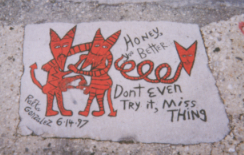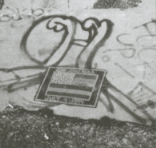new posts in all blogs
Viewing: Blog Posts Tagged with: christopher, Most Recent at Top [Help]
Results 1 - 7 of 7
How to use this Page
You are viewing the most recent posts tagged with the words: christopher in the JacketFlap blog reader. What is a tag? Think of a tag as a keyword or category label. Tags can both help you find posts on JacketFlap.com as well as provide an easy way for you to "remember" and classify posts for later recall. Try adding a tag yourself by clicking "Add a tag" below a post's header. Scroll down through the list of Recent Posts in the left column and click on a post title that sounds interesting. You can view all posts from a specific blog by clicking the Blog name in the right column, or you can click a 'More Posts from this Blog' link in any individual post.

By: Sarah Hansen,
on 5/1/2014
Blog:
OUPblog
(
Login to Add to MyJacketFlap)
JacketFlap tags:
island,
brother,
America,
christopher,
slideshow,
Christopher Payne,
payne,
*Featured,
Art & Architecture,
Images & Slideshows,
Robert Sullivan,
fordham university press,
mason,
Distribution Clients,
New York City History,
north brother island,
Randall Mason,
randall,
meadowlands,
sullivan is,
Books,
History,
New York City,
Add a tag
New York City, five boroughs boasting nine million people occupying an ever-expanding concrete jungle. The industrial hand has touched almost every inch of the city, leaving even the parks over manicured and uncomfortably structured. There is, however, a lesser known corner that has been uncharacteristically left to regress to its natural state. North Brother Island, a small sliver of land situated off the southern coast of the Bronx, once housed Riverside Hospital, veteran housing, and ultimately a drug rehabilitation center for recovering heroin addicts. In the 1960s the island, once full with New Yorkers, became deserted and nature has been slowly swallowing the remaining structures ever since. Christopher Payne, the photographer behind North Brother Island: The Last Unknown Place in New York City, was able to access the otherwise prohibited to the public island, and document the incredible phenomenon of the gradual destruction of man’s artificial structures.
-
Tuberculosis Pavilion, Spring
http://blog.oup.com/wp-content/uploads/2014/04/Tuberculosis-Pavilion.jpg
-
St. John by-the-sea Church
http://blog.oup.com/wp-content/uploads/2014/04/Church.jpg
-
Classroom, Service Building
http://blog.oup.com/wp-content/uploads/2014/04/Classroom.jpg
-
Old Coal House
http://blog.oup.com/wp-content/uploads/2014/04/Coal-House.jpg
-
Library Books in a Male Dormitory
http://blog.oup.com/wp-content/uploads/2014/04/Books.jpg
-
View of Manhattan Dusk, High Tide
http://blog.oup.com/wp-content/uploads/2014/04/Beach-at-Dusk.jpg
North Brother Island: The Last Unknown Place in New York City: Photographs by Christopher Payne, A History by Randall Mason, and Essay by Robert Sullivan (A Fordham University Press Publication). Christopher Payne, a photographer based in New York City, specializes in the documentation of America’s vanishing architecture and industrial landscape. Trained as an architect, he has a natural interest in how things are purposefully designed and constructed, and how they work. Randall Mason is Associate Professor and Chair of the Graduate Program in Historic Preservation at the University of Pennsylvania’s School of Design. He worked previously at the Getty Conservation Institute, University of Maryland, and Rhode Island School of Design. Robert Sullivan is the author of numerous books, including The Meadowlands: WildernessAdventures at the Edge of a City; Rats: Observations on the History and Habitat of the City’s Most Unwanted Inhabitants; The Thoreau You Don’t Know: The Father of Nature Writers on the Importance of Cities, Finance, and Fooling Around; A Whale Hunt, and, most recently, My American Revolution. His stories and essays have been published in magazines such asNew York, The New Yorker, and A Public Space. He is a contributing editor to Vogue.
Subscribe to the OUPblog via email or RSS.
Subscribe to only American history articles on the OUPblog via email or RSS.
The post Window into the last unknown place in New York City appeared first on OUPblog.


By: Kirsty,
on 8/1/2011
Blog:
OUPblog
(
Login to Add to MyJacketFlap)
JacketFlap tags:
History,
Africa,
UK,
Videos,
Video,
australia,
crime,
Multimedia,
christopher,
prison,
britain,
punishment,
emma,
criminals,
empire,
slave trade,
*Featured,
a merciless place,
emma christopher,
merciless,
misjudgement,
desertions,
jzzclcrh1zu,
convicts,
Add a tag
A Merciless Place is a story lost to history for over two hundred years; a dirty secret of failure, fatal misjudgement and desperate measures which the British Empire chose to forget almost as soon as it was over.


By: Michelle,
on 6/21/2011
Blog:
OUPblog
(
Login to Add to MyJacketFlap)
JacketFlap tags:
censorship,
New York Times,
gay,
lesbian,
US,
aids,
art,
homosexuality,
christopher,
museums,
imagery,
moma,
george segal,
*Featured,
reed,
Audio & Podcasts,
Art & Architecture,
Images & Slideshows,
christopher reed,
david wojnarowicz,
hide/sheek show,
pawnee,
stonewall riots,
overt,
Add a tag
By Justyna Zajac and Michelle Rafferty
“Growth of Overt homosexuality in City Provokes Wide Concern”
-New York Times (headline in 1963)
The world recoiled when the gay community started receiving credit for its influence in fashion and culture, but at least, according to Christopher Reed, they were being acknowledged. In his new book Art and Homosexuality: A History of Ideas, Reed argues that for some time the professional art world plain ignored the gay presence.
We had the chance to speak with Reed recently at his Williams Club talk, where he laid out the tumultuous relationship between art and activism. Below we present a few of the controversial things we learned.
1.) Art that didn’t get a chance…
During the most formative years of the gay rights movement in the 70s and on through the late 80s, arts publications and professionals, and even museums like the Museum of Modern Art, ignored imagery associated with gay and lesbian identity. Imagery like the graffiti pictured below which emerged in urban areas during the 70s:


Grafitti on “The Rocks,” Lincoln Park, Chicago, mid-1990s.
According to Reed, “These sites of visual history were destroyed with no organized documentation when rising property values prompted local governments to reclaim these areas.”
2.) Censorship…
Is right for people to ban art today? Even if it’s in the imaginary town of Pawnee, Indiana? Reed surprised us with his answer, making us consider that there’s actually a worse kind of censorship. Listen below to hear what he said.
Transcript:
Censorship is an interesting question because there are overt examples of censorship like what just happened with the Hide/Seek show and the David Wojnarowicz piece, where particular politicians make a statement to their constituency by removing something that’s on exhibition. And then the kind of thing that you’re talking about where institutions simply don’t show things or don’t buy things – in the case of libraries – or don’t do things or don’t let particular people in, which often doesn’t read as censorship because people never realize what they could be seeing or could be reading, or could be going on, because the institution has already created a kind of logic in which that kind of thing doesn’t exist.
And so in a lot of ways I actually think that’s the most dangerous kind of censorship because people aren’t aware of it and they can’t make a
We survived the prom, and I use the collective pronoun because not having gone to my own prom, I had no idea how many details went into those few hours of fun. I began having wedding preparation flashbacks.
But here he is, minutes before the limo arrived. Doesn't he look de-lighted at his mom taking his picture?
He's slightly happier here. At least he looked up from his texting (if you look closely, you can see his phone in his hand) at his little sister who was taking his picture.
Much happier here - picture taking is almost over at this point and very, very soon, he will make his escape.
After they left, Emma informed me that she wanted a pink limo and went into incredible detail about her future dress, hairstyle and shoes. Oh, the shoes -- orchids (real ones) appliqued on satin.
Philip, on the other hand, began looking at the credit card receipts. He informed me that for less than the cost of the prom, he could go to a water park, order pepperoni pizza every night for ten nights, get a bunch of songs on I Tunes and buy some new sneakers. "It's like you have to spend time with the people from school and pay for it."
I told him that even though the prom was being held in a hotel near Atlantic City, the teachers from school were chaperoning.
"There are teachers there? What? Chaperoning? Are you kidding me? Why would anyone ever spend all that money to go be with them. I just want the cash instead of the prom. The teachers probably don't even pay to go."
To say Philip and Christopher are different kids is to say there is water in the ocean. But the first prom is over.
What I didn't tell Philip is that Christopher is going to hers on Saturday. Yup, two proms in eight days. It's like arranging one last, giant play date.

By: Rebecca,
on 10/20/2008
Blog:
OUPblog
(
Login to Add to MyJacketFlap)
JacketFlap tags:
Kerry,
Richard,
Powell,
Hagel,
Colin,
Lugar,
Charles Krauthhammer,
Christopher Buckley,
Chuck Hagel,
Colin Powell,
John Kerry,
Richard Lugar,
spreading,
Krauthhammer,
Karl,
John,
Buckley,
Bush,
Chuck,
Christopher,
McCain,
Rove,
George,
Politics,
Current Events,
American History,
A-Featured,
Media,
John McCain,
Barack Obama,
Obama,
Charles,
Barack,
George Bush,
liberalism,
Karl Rove,
independents,
Add a tag
Elvin Lim is Assistant Professor of Government at Wesleyan University and author of The  Anti-intellectual Presidency, which draws on interviews with more than 40 presidential speechwriters to investigate this relentless qualitative decline, over the course of 200 years, in our presidents’ ability to communicate with the public. He also blogs at www.elvinlim.com. In the article below he reflects on the rehabilitation of liberalism. Read his previous OUPblogs here.
Anti-intellectual Presidency, which draws on interviews with more than 40 presidential speechwriters to investigate this relentless qualitative decline, over the course of 200 years, in our presidents’ ability to communicate with the public. He also blogs at www.elvinlim.com. In the article below he reflects on the rehabilitation of liberalism. Read his previous OUPblogs here.
Whatever happens at the polls in two weeks, the pendulum has swung back in Liberalism’s direction. Economically, culturally, and ideologically, liberal answers are regaining legitimacy.
After all, even though the Democratic party nominated a liberal anti-war candidate over a more moderate establishment candidate this year, and the Republicans turned to a maverick with a reputation for bi-partisanship, the Democratic candidate is ahead in practically every battleground state that George Bush won in 2004.
How quickly times have changed. Whereas John Kerry was swiftboated in 2004, Obama (like Reagan) is developing Teflon powers as he continues to ride his surge in the polls despite stories about Jeremiah Wright, Bill Ayers, and ACORN. When terrorism was issue number one, people preferred a Republican president; but when the economy becomes issue number one, people prefer a Democratic president.
This is why Sarah Palin’s charge that “‘spreading the wealth‘ sounds a little like socialism” isn’t getting much traction. Spreading the wealth sounds like sharing the wealth, and these days such thoughts aren’t all that unpopular. After all, the Bush administration’s decision to obtain equity stakes in several private banks in return for a liquidity injection isn’t exactly laissez faire.
Culturally, the country appears to have moved on from those culture wars we heard so much about just four years ago. Just this year, the California and Connecticut Supreme Courts’ decisions to legalize same-sex marriage and the lackluster response from the conservative community indicates the shifting cultural tectonics. Abortion isn’t such a hot button issue this year either. Anti-abortion Catholics have endorsed Obama in significant numbers. If anything, McCain’s selection of a running mate who will not make an exception to her pro-life position for rape and incest reveals a campaign completely in illusion about where the country is culturally. McCain’s contempt for the “health” exception for women will seriously damage his chances with women.
We also see the ideological shift in cross-party endorsements for Obama. Breaking a century and a half year old tradition, the Chicago Tribune has endorsed Barack Obama. Christopher Buckley’s defection is both substantially and symbolically powerful, as were the endorsements of Chuck Hagel and Richard Lugar. And now Colin Powell has joined the bandwagon, characterizing Obama as a “transformational” leader. The last time we saw such language being used to describe a potential president was during the landslide and realigning elections of 1932 and 1980.
In the days to come, Republicans will push back to insist that this is still a “center-right” country - as Karl Rove and Charles Krauthhammer have done - and they will try to remind Americans that Democratic control of all branches of government may not be a good idea. But if the result of the White House race is still unclear, no one doubts that the Democrats will strengthen their majorities in both the House and the Senate. Average Joe, the median independent voter has moved to the Left of Plumber Joe, the median Republican voter. It may be time to excavate “liberal” and “liberalism” from the dictionary of political incorrectness.
ShareThis
****Inspired by Leonardo's Notebooks, author Grey creates a portrait of the famous painter and inventor as imaginitively seen through the eyes of his faithful young servant Giacomo. Much of the plot concerns the completion of the fresco, th

I had every intention of posting a review of this fabulous book to the right today. It's going to have to wait until tomorrow, however, as not just one, but two audio books had me glued to the ipod.
First up was John Banville's Christine Falls. This is a mystery he wrote under the pen name Benjamin Black. I loved Banville's The Sea, which won the 2005 Man Booker Prize. Loved it. But I have to say that Christine Falls--a mystery, no less--may have even been better. Hands down, Banville's use of POV in Christine Falls was the most skillful I've seen in years. It's a slow read (or listen), because it's fairly dense, but immensely rewarding.
Next up was Lionel Shriver's We Need to Talk About Kevin. I purchased this one before the Virginia Tech atrocities, so was reluctant to read another school shooting novel. But...it gripped me from the first moment. Unlike Christine Falls, in which multiple POVs conflict and contradict one another, there is only one point of view in We Need to Talk About Kevin. A one-sided epistolary novel, We Need to Talk About Kevin is compelling from start to finish. And, there's a reason almost every critic used the world "unflinching" in regards to this novel. Narrator Eva is not perfect--she's arrogant, yet critical of herself. She's impatient, yet tries as best she can as a mother. She's almost a genetic copy of her son, but can barely tolerate him from birth. 15 hours and I listened to it all--including the interview at the end. ** And, while I had imagined the ending as one of possible outcomes, it didn't bother me in the least.
Tomorrow I'll be back, I promise. I lost a day to stories.
=============================
**I will mention here that the audio of We Need to Talk About Kevin was, in some ways, a trial. I could hear the narrator's every swallow, every intake of breath, every drink of water. The narrator herself was quite good, but the editing, obviously, left something to be desired. Read this one instead if extraneous noises between sentences bother you :)







Had you gone to your own prom, you'd still be boggled by today's prom prep. For most teens, the prom is more to-do, and more expensive, than their grandmas' weddings, I'd wager. It's the whole princess phenom, IMO. I adore Philip's comments. And yours about the last, giant play date.
Yikes! Glad we don't have proms here - way too much prep for me! :)
I hope the prom goers had fun - great photos!
I was thinking about that, Marcia - how celebrations used to be so much simpler, more at home. And yes, I think I spent more on that one prom than either of my grandmothers did on their weddings. I also wonder if I didn't have more rules to follow: this kind of limo, that kind of tie on the tux, the vest has to match the dress...
And yes, Philip is either that much younger than Christopher or that much more practical. I'll know in a couple of years.
I didn't know they didn't have proms in Canada, Jemi! You mean I could have moved a little north to avoid all this? But then I'd have to figure out what Boxing Day is -
OMG, best quote ever: "It's like you have to spend time with the people from school and pay for it." Your son sounds amazing. I adore him already. But you survived the Prom! that's wonderful. and what a handsome couple, too. Good on you, Mama for making it through!
Philip and I see eye to eye on proms.
I didn't go to my high school prom, not because I wouldn't have liked to, but because as a nerd, I was sadly not invited. But your son has nailed it: you have to spend a ton of money to be with people you don't much like. It's all a load of hype and baloney. But if I were 17 and somebody asked me, I would almost certainly say yes -- just for the experience...
Now that's a handsome couple! I love his date's dress.
I didn't go to my prom either. I don't even think our school had one. Things sure have changed, mostly just to become more expensive, alas.
I'd rather have the pizzas, myself. :)